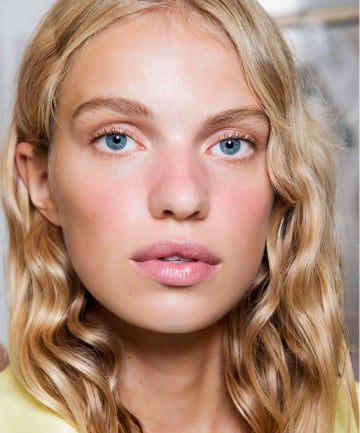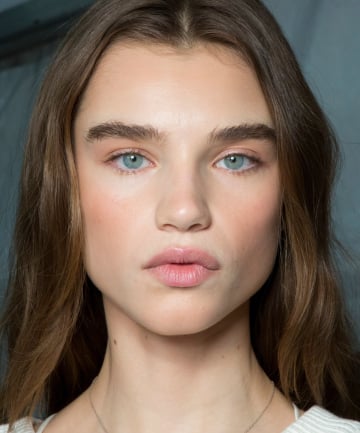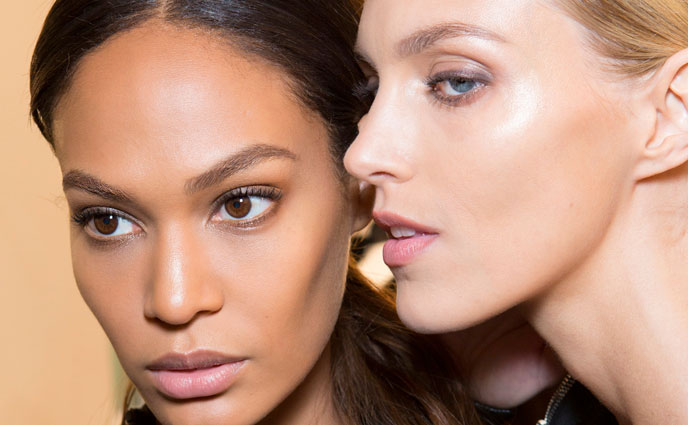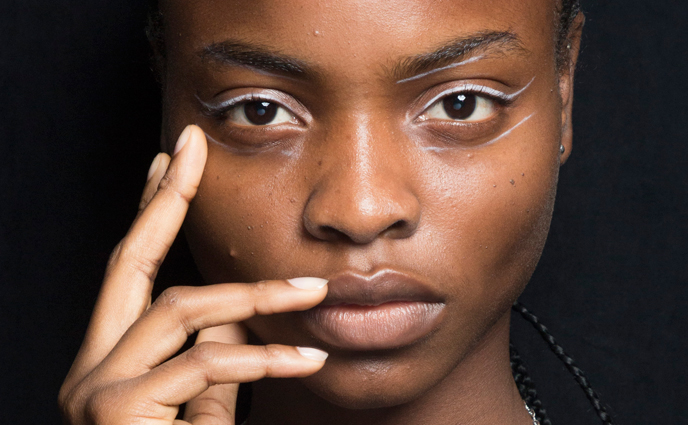You knew there had to be a flip side, right? Shamban says that there are studies that make cases against melatonin for skin care. Some information indicates that using melatonin topically can increase pigmentation. This is because melatonin activates melanocytes, aka the specialized cells in the dermis that make melatonin — and more active melanocytes can lead to an increase in discoloration and sun spots.
"It might be best to use [melatonin] only in winter months after any sun damage and discoloration is lessened," says Shamban. "And only after a series of lasers or peels to help even discoloration and eliminate the majority of dark spots." Those with highly uneven skin or hyperpigmentation might want to avoid melatonin skin care altogether.
Image via Imaxtree
"It might be best to use [melatonin] only in winter months after any sun damage and discoloration is lessened," says Shamban. "And only after a series of lasers or peels to help even discoloration and eliminate the majority of dark spots." Those with highly uneven skin or hyperpigmentation might want to avoid melatonin skin care altogether.
Image via Imaxtree
Melatonin is produced in the body and skin. The body is hard at work always sensing for concentrations of all cell messengers and chemicals that are being produced or taken up. To this point, Akridge says that he hasn't seen a study that takes into account what happens in skin to natural melatonin production when more is applied to skin. Typically, natural production of anything is regulated — which could impact results of melatonin skin care products.
Image via Imaxtree
Image via Imaxtree
Are you wondering whether applying melatonin to skin topically will make you sleepy? There's no need for concern. Imber says the ingredient will not be absorbed in significant quantities that would affect your circadian rhythms. It's the same deal with the reverse: Melatonin drops that are ingested for the benefit of the circadian rhythm have little, if any, external benefits to skin.
Melatonin is suitable for all skin types, from aging to acne-prone skin. There might be some formulations that are tailored to specific skin types depending on the concentration, says Akridge. Ultimately, it's the other ingredients in the formula that will be the deciding factors(s) on whether the finished product is good for a specific skin type says celebrity esthetician Olga Lorencin, Founder of Olga Lorencin Transformative Skin Care and Olga Lorencin Skin Care Clinic.
Dr. Marko Lens, plastic and reconstructive surgeon and founder of Zelens, also adds that it's good to pair melatonin with peptides to boost skin renewal. Furthermore, combining melatonin with other antioxidants (for example, vitamin C) can increase their free radical fighting capabilities. In terms of what not to pair with melatonin, Akridge says that no one knows for sure what to avoid at this point.
Image via Imaxtree
Melatonin is suitable for all skin types, from aging to acne-prone skin. There might be some formulations that are tailored to specific skin types depending on the concentration, says Akridge. Ultimately, it's the other ingredients in the formula that will be the deciding factors(s) on whether the finished product is good for a specific skin type says celebrity esthetician Olga Lorencin, Founder of Olga Lorencin Transformative Skin Care and Olga Lorencin Skin Care Clinic.
Dr. Marko Lens, plastic and reconstructive surgeon and founder of Zelens, also adds that it's good to pair melatonin with peptides to boost skin renewal. Furthermore, combining melatonin with other antioxidants (for example, vitamin C) can increase their free radical fighting capabilities. In terms of what not to pair with melatonin, Akridge says that no one knows for sure what to avoid at this point.
Image via Imaxtree
In the world of science, there needs to be more research done to fully understand melatonin and its true benefits. (Even the exact reasons why it helps us fall asleep are unclear, per Akridge). There's potential for melatonin to expand into other aspects of beauty given that skin and hair follicles are melatonin receptive. For her part, Shamban is already testing new serums at the Hair Rejuvenation Center at Ava MD in Beverly Hills.
There's even some early research that shows melatonin could slow down the growth of tumors, as well as help with DNA repair. Lorencin says that she would like to see this explored more — and we'd have to agree.
Image via Imaxtree
There's even some early research that shows melatonin could slow down the growth of tumors, as well as help with DNA repair. Lorencin says that she would like to see this explored more — and we'd have to agree.
Image via Imaxtree








